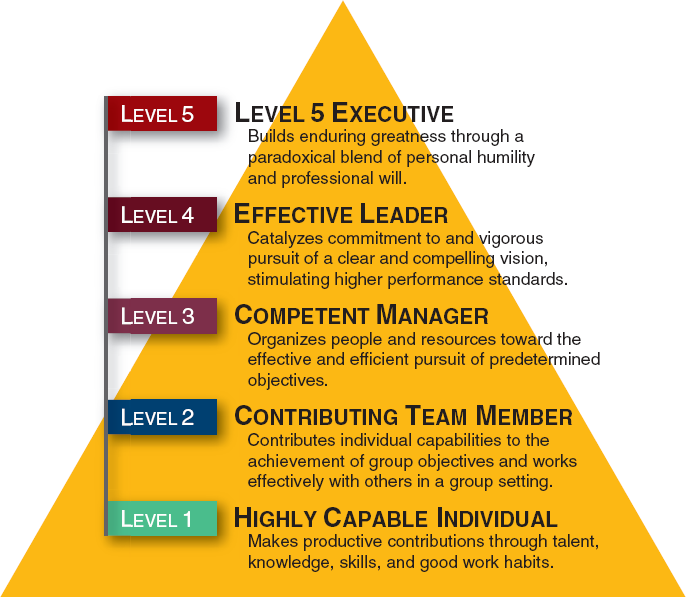
"You can accomplish anything in life, provided that you do not mind who gets the credit." - Harry S. Truman
Definition
Level 5 leadership refers to a five-level hierarchy of executive capabilities, with level 5 at the top. Level 5 leaders embody a paradoxical mix of personal humility and professional will. They are ambitious, but ambitions first and foremost for the company, not themselves.

Key traits of level 5 leaders
In short, Personal Humility + Professional Will = Level 5
The successors
Set up their successors for even greatr success in the next generation, whereas egocentric Level 4 leaders often set up their successors for failure.
A compelling modesty
Display a compelling modesty. Those who worked with or wrote about the good-to-great leaders continually used words like quiet, humble, modest, reserved, shy, gracious, mild-mannered, self-effacing, understated, did not believe his own clippings, etc.
In contrast, two-thirds of the comparison companies had leaders with gargantuan personal egos that contributed to the demise or continued mediocrity of the company.
One of the most damaging trends in recent history is the tendency (especially by boards of directors) to select dazzling, celebrity leaders and to de-select potential level 5 leaders.
Unwavering resolve
Have the unwavering resolve to do what must be done to make the company great. The leaders will sell the mills or fire their brother if that's what it takes to make the company great.
The evidence doesn't support the idea that you need an outside leader to come in and shake up the place to go from good to great. In fact, going for a high-profile outside change agent is negatively correlated with a sustained transformation from good to great.
The Window and the Mirror
Level 5 leaders look out the window to apportion credit to factors outside themselves when things go well (and if they cannot find a specific person or event to give credit to, they credit good luck). At the same time, they look in the mirror to apportion responsibility never blaming bad luck when things go poorly.
The comparison leaders did just the opposite. They look out the window for something or someone outside themselves to blame for poor results but would preen in front of the mirror and credit themselves when things went well.
Cultivating level 5 leadership

Q: Can't I make this a great company if I'm not level 5?
Long A: Jame Collins doesn't know for certain that you absolutely must be a Level 5 leader to make your company great. But the data showed that all of the great companies had level 5 leadership in key positions, including the CEO, at the pivotal time of transition.
Short A: Level 5 leadership might be not a must to make a company great, yet the key positions in that company are likely to have level 5 leadership.
Q: Can we learn to become level 5?
A: Level-5 is a very satisfying idea, a powerful idea, and, to produce the best transitions from good to great, perhaps an essential idea. A Ten-Step List to level 5 would trivialize the concept. The authors' best advice is to begin practicing the other good-to-great disciplines we discovered.
On the one hand, level 5 traits enable you to implement the other findings. On the other hand, practicing the other findings helps you to become level 5. Think of it this way this chapter is about what level 5s are; the rest of the book describes what they do. Leading with other disciplines can help you move in the right direction. There's no guarantee that doing so will turn you into a full-fledged level 5, but it gives you a tangible place to begin.
Takeaways
Level 5 leadership is an empirical finding, not an ideological one.
Many people have the potential to evolve into level 5. Potential level 5 leaders exist all around us if we know what to look for.